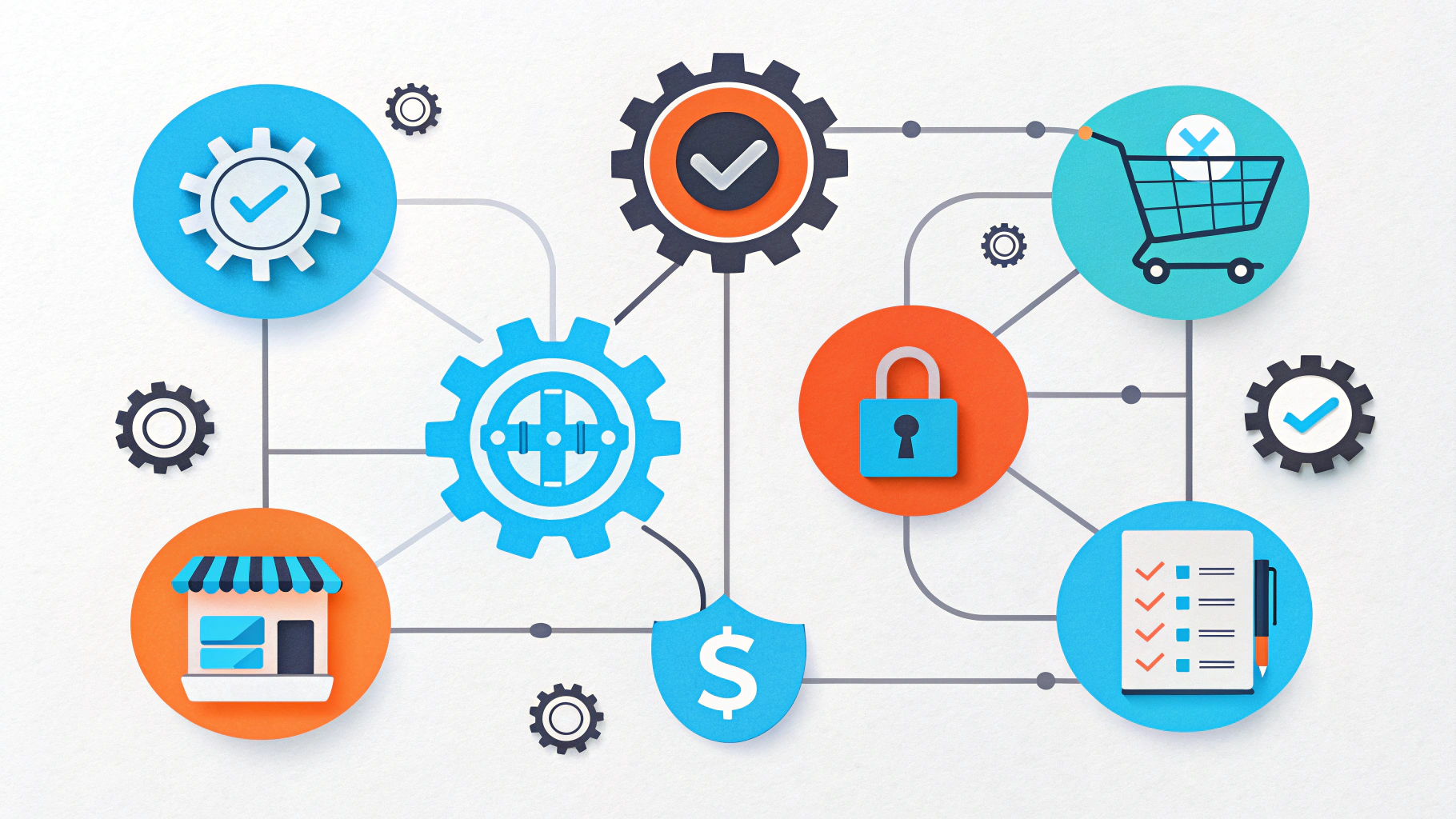The world of eCommerce is evolving at an unprecedented pace, and Artificial Intelligence (AI) is at the forefront of this revolution. From personalized shopping experiences to advanced fraud detection, AI is reshaping how online businesses operate. But while the benefits of AI in eCommerce are vast, its implementation also comes with unique challenges. In this post, we explore the key ways AI is revolutionizing online retail, its advantages, and the hurdles businesses must overcome to make the most of this technology.
Key Use Cases of AI in eCommerce

1. Personalized Shopping and Recommendations
One of the most powerful AI-driven innovations in eCommerce is personalization. AI algorithms analyze customer behavior, browsing history, and past purchases to offer highly relevant product recommendations. Companies like Amazon and Sephora leverage AI-driven recommendation engines to boost sales and enhance the customer experience. AI-powered recommendations can increase conversion rates by up to 26%, making them a crucial tool for eCommerce success.
2. Smart Search and Visual Recognition
AI enhances search functionality by understanding user intent, reducing bounce rates, and improving customer engagement. Advanced search engines powered by AI use natural language processing (NLP) and deep learning to interpret user queries more effectively. Additionally, visual search technology allows customers to upload images and find similar products, bypassing the need for traditional keyword searches.
3. AI-Powered Chatbots and Virtual Assistants
AI-driven chatbots are transforming customer service in eCommerce. These virtual assistants provide instant, 24/7 support, answering queries about product availability, return policies, and order tracking. Many consumers now prefer AI chatbots over human support due to their efficiency, with 61% of customers stating they appreciate AI-powered instant responses.
4. Voice Commerce
AI-powered voice assistants like Alexa and Google Assistant are enabling voice commerce, allowing users to shop using voice commands. As consumers become more comfortable with voice search, businesses are optimizing their online stores for this growing trend.
5. Dynamic Pricing and Demand Forecasting
AI-driven pricing strategies adjust product prices in real time based on demand, competitor pricing, and market trends. For example, Amazon frequently updates prices to maximize sales while maintaining competitiveness. Additionally, AI forecasting tools predict sales trends and help businesses optimize stock levels, ensuring the right products are available at the right time.
6. Fraud Detection and Security
ECommerce fraud is a significant concern, with global fraud losses expected to exceed $48 billion. AI-powered fraud detection systems analyze transaction patterns to identify suspicious activities, blocking fraudulent transactions in real time. These AI models adapt continuously, making them more effective than traditional rule-based security systems.
7. Inventory and Supply Chain Optimization
AI plays a vital role in managing inventory efficiently by predicting demand, reducing overstock and understock situations, and automating warehouse operations. Fast-fashion brands like Shein use AI to adjust production based on customer preferences, reducing waste and optimizing distribution.
8. AI-Generated Content and Marketing Automation
From AI-powered email marketing to content generation, AI is transforming digital marketing strategies. AI tools can optimize email send times, personalize subject lines, and generate SEO-friendly product descriptions, increasing engagement and conversion rates.
Benefits of AI in eCommerce
The integration of AI into eCommerce provides businesses with a competitive edge. Here are some of the most significant benefits:
- Enhanced Customer Experience – AI enables hyper-personalization, making shopping more seamless and enjoyable.
- Higher Conversion Rates – Personalized recommendations, smart search, and dynamic pricing encourage more purchases.
- Operational Efficiency – AI automates repetitive tasks, from customer support to warehouse management.
- Cost Reduction – AI optimizes resource allocation, reducing unnecessary expenses in inventory and marketing.
- Stronger Security – AI-driven fraud detection minimizes financial losses and increases customer trust.
- More Accurate Forecasting – AI-driven insights help businesses make data-driven decisions to plan for future demand.
Challenges of AI Implementation in eCommerce

While AI offers immense potential, implementing it in eCommerce comes with hurdles that businesses must navigate:
1. Data Privacy and Security Risks
AI systems rely on vast amounts of customer data, raising concerns about privacy compliance (e.g., GDPR, CCPA). Businesses must ensure strong security measures, including encryption and anonymization, to protect customer information.
2. Data Quality and Management
AI models require high-quality, well-structured data. Many businesses struggle with incomplete, inconsistent, or siloed data, which can lead to inaccurate AI insights. Effective data governance and integration across platforms are crucial for AI success.
3. Customer Trust and AI Transparency
Some shoppers remain skeptical about AI-driven recommendations and automation, fearing excessive data tracking or biased decision-making. Transparency about AI usage and clear communication with customers are essential to building trust.
4. Technical Integration and Compatibility
Many eCommerce platforms operate on legacy systems that are not AI-ready. Implementing AI requires seamless integration with existing infrastructure, which can be complex and costly.
5. Skill Gaps and Resource Constraints
The demand for AI talent far exceeds supply, making it difficult for businesses to hire skilled professionals. Many eCommerce teams lack in-house AI expertise, which can slow down implementation.
6. Ethical Concerns and AI Bias
AI algorithms can unintentionally inherit biases from training data, leading to unfair recommendations or discriminatory practices. Ensuring ethical AI use requires ongoing monitoring and adjustment of algorithms.
7. High Implementation Costs
Developing custom AI solutions requires significant investment in technology, talent, and infrastructure. While AI-powered SaaS solutions offer cost-effective alternatives, businesses must carefully evaluate ROI before implementation.
Overcoming AI Implementation Challenges
To maximize AI’s potential in eCommerce, businesses must address these challenges strategically:
- Invest in Data Security and Compliance – Implement strong security measures, conduct regular audits, and comply with data protection regulations.
- Improve Data Quality – Standardize and integrate data sources to ensure AI systems work with accurate and complete information.
- Educate Customers – Increase transparency by explaining how AI-driven features enhance their shopping experience.
- Leverage Third-Party AI Solutions – Use AI tools that seamlessly integrate with existing eCommerce platforms to minimize development costs.
- Upskill Teams and Partner with AI Experts – Provide AI training for internal teams and collaborate with AI specialists to bridge knowledge gaps.
- Implement Ethical AI Practices – Regularly audit AI algorithms to detect and mitigate biases.
Final Thoughts: Is Your eCommerce Business Ready for AI?
AI is no longer an emerging trend - it’s a necessity for eCommerce businesses that want to stay competitive. Whether it's improving customer experiences, optimizing operations, or boosting security, AI provides invaluable advantages. However, businesses must approach AI adoption strategically, ensuring data privacy, ethical use, and seamless integration.
At Flexi IT, we specialize in implementing AI-driven solutions for eCommerce businesses, helping them leverage technology for growth. If you're looking to integrate AI into your online store, get in touch with us today! Let’s build the future of eCommerce together.






